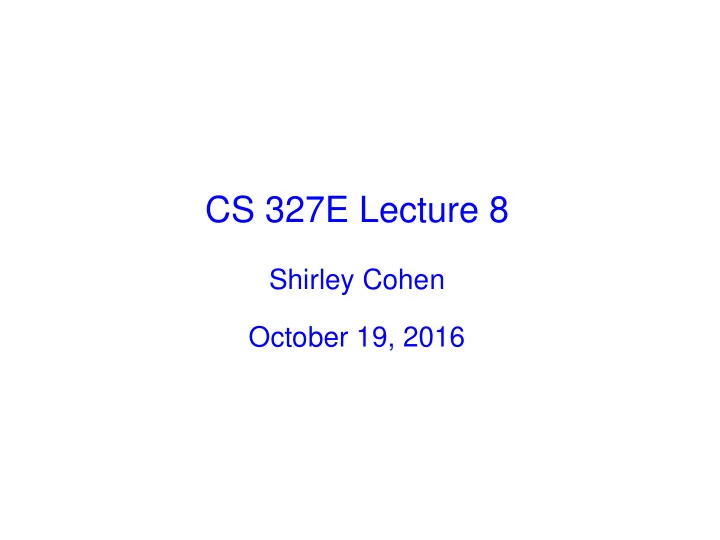

CS 327E Lecture 8 Shirley Cohen October 19, 2016
Homework for Today • Chapters 3 and 4 from the Learning SQL book • Exercises at the end of assigned chapters
Quiz Question 1 Which of the following clauses removes unwanted records from a result set? A. FILTER B. GROUP BY C. WHERE D. VIEW
Quiz Question 2 What keyword removes duplicate entries from the result set? A. DEDUP B. ALTER C. UNIQUE D. DISTINCT
Quiz Question 3 A JOIN is a mechanism for linking two tables. A. True B. False
Quiz Question 4 Which one of the following will return only the NULL records? A. SELECT * FROM TableName WHERE ColumnName IS NULL B. SELECT * FROM TableName WHERE ColumnName == NULL C. SELECT * FROM TableName WHERE ColumnName = NULL D. SELECT * FROM TableName WHERE ColumnName = ' NULL '
Quiz Question 5 Is the following query syntactically mysql> describe customer; correct? +--------------+------------------+ | Field | Type | +--------------+------------------+ SELECT cust_id, fed_id, | cust_id | int(10) unsigned | address | fed_id | varchar(12) | | cust_type_cd | enum('I','B') | FROM customer | address | varchar(30) | ORDER BY fed_id, 1; | city | varchar(20) | | state | varchar(20) | | postal_code | varchar(10) | A. No, since 1 does not correspond +--------------+------------------+ to a valid column B. No, since the ORDER BY syntax requires that columns be specified in schema order C. Yes
Concept Question 1 Suppose we have a product catalog database as illustrated by the diagram below. How can we retrieve the model number, speed, and hard drive capacity for all the PCs that cost less than $500? A. SELECT model, speed, hd FROM PC WHERE price < 500 B. SELECT p.model, pc.speed, pc.hd FROM Product p, PC pc WHERE p.model = pc.model AND pc.price < 500 C. Either A or B D. Neither A or B E. Not enough information
Concept Question 2 How can we find the model number, speed, and hard drive capacity of all PCs that have a 12x or 24x CD drives and that cost less than $600? A. SELECT model, speed, hd FROM PC WHERE price < 600 AND cd = '12x' OR cd = '24x' B. SELECT model, speed, hd FROM PC WHERE price < 600 AND cd IN ('12x', '24x') C. SELECT model, speed, hd FROM PC WHERE price < 600 AND cd = '12x' AND cd = '24x' D. None of the above
Concept Question 3 Suppose we have a database for a retail store. This database tracks customers, orders, inventory, products, and vendors. We want to obtain a list of our vendors, but we are only interested in those vendors who are not based in Austin. What SQL query can we use to retrieve all vendors who are not local? A. select vendName from Vendors where vendCity <> 'AUSTIN' B. select vendName from Vendors where UPPER( vendCity) <> ' AUSTIN ' C. select vendName from Vendors where UPPER(vendCity) <> ' AUSTIN ' or vendCity is null D. Any of the above E. None of the above
Concept Question 4 We have a retail store database that keeps information about the items belonging to an order in a table Order_Details . How can we produce a report of all the order items that is first sorted by OrderNumber (lowest to highest) and secondly sorted by Price (highest to lowest)? A. SELECT * FROM Order_Details Order_Details (OrderNumber, SKU, Quantity, Price, ExtendedPrice) B. SELECT OrderNumber FROM Order_Details SELECT * FROM Order_Details ORDER BY OrderNumber, Price C. SELECT * FROM Order_Details ORDER BY OrderNumber DESC, Price DESC D. SELECT * FROM Order_Details ORDER BY OrderNumber ASC, Price DESC E. None of the above
Concept Question 5 We have the same Order_Details table as before. This time we want to generate a report of all the items or SKUs that have ever been ordered. We only want a single record per SKU regardless of how many orders it belongs to. We also want to sort the results by SKU from lowest to highest. A. SELECT * FROM Order_Details Order_Details (OrderNumber, SKU, Quantity, Price, ExtendedPrice) ORDER BY SKU SELECT * FROM Order_Details B. SELECT DISTINCT SKU FROM Order_Details ORDER BY SKU DESC C. SELECT DISTINCT SKU FROM Order_Details ORDER BY SKU ASC D. None of the above E. Not enough information
Concept Question 6 We have a database that tracks software defects. We want to look-up all the defects that are both unassigned and active . Assume that the assigned_to field indicates that a defect has been assigned when it is not null. Assume that an active defect means a status of not ' CLOSED ' . A. select * from Defects CREATE TABLE Accounts ( where assigned_to IS NULL account_id INT PRIMARY KEY, and (status <> 'CLOSED' account_name VARCHAR(20), or status IS NULL) first_name VARCHAR(20), B. select * from Defects last_name VARCHAR(20), email VARCHAR(100), where assigned_to IS NULL password_hash CHAR(64), and status <> 'CLOSED' ...); C. select * from Defects where assigned_to = NULL CREATE TABLE Defects ( and (status <> 'CLOSED' bug_id INT PRIMARY KEY, date_reported DATE NOT NULL, or status = NULL) summary VARCHAR(80), D. select * from Defects reported_by INT NOT NULL, where assigned_to IS NULL assigned_to INT, and status NOT IN status enum('NEW', 'OPEN', 'QA', 'CLOSED'), ('CLOSED') ... FOREIGN KEY (reported_by) REFERENCES E. None of the above Accounts(account_id), FOREIGN KEY (assigned_to) REFERENCES Accounts(account_id));
Homework • Read chapters 5 and 10 from the Learning SQL book • Exercises at the end of assigned chapters
Recommend
More recommend